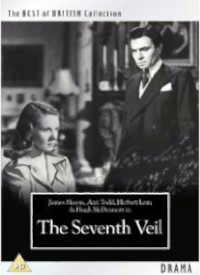- This essay will inevitably contain spoilers!
'THE SEVENTH VEIL' (1945)

- A review by Richard Harrison (2009)
Despite the many technological advances that 21st Century living supposedly has, it is this author’s continual contention that there existed more film genres in the monochrome-dominated cinema of previous generations. After all, so my argument goes, audiences could choose from the same genres that we have now (be it with a limited range of sub-genres before terms such as ‘slasher horror’ and ‘gross-out comedy’ fought their way onto the cinematic landscape). Horrors, comedies, melodramas, musicals, gangster films- all these were available to our forefathers. In addition, they could add a frequent dose of westerns (a genre that is certainly a rather sporadic one nowadays) and a bizarre collection of minor genres/cycles of film- South Sea island films, African adventure films, desert-set military films and psychoanalytic films to name but a few. The Seventh Veil was released in 1945 is an unusual film in that it is a big star movie (as James Mason, Ann Todd and Herbert Lom all vie for top billing) yet it is a psychoanalytic film above all else despite its inclusion of music and melodrama aspects.
Another factor that makes The Seventh Veil such an unusual film is its narrative structure. Told in a Film Noir-esque flashback style (but with Francesca Cunningham narrating the film instead of the predominant male figure associated with the aforementioned visual style), it communicates to the audience by establishing an enigma- why does Francesca find herself in such a situation?- before unravelling it through the tapestry of intrigue, love and domination. ‘Those first few weeks with Nicholas were the loneliest I ever spent…’ almost whispers Ann Todd as Francesca, the mise-en-scene conveying this in its framing of Nicholas (formally dressed in a dark suit) standing in dominating position in the foreground as Francesca (largely in white) sits demurely at the very back of the frame. It is the representation of their relationship which makes The Seventh Veil such an interesting film, as preconceptions and stereotypes are broken- as in life itself what is easy becomes difficult and vice-versa.
Contextually, The Seventh Veil fits into an intriguing year for British cinema which was at the end of wartime propaganda and documentary but still reflecting life-as-it-was (Waterloo Road and A Diary For Timothy and The Way To The Stars being just three films that year to deal with war and its aftermath).
Whether they deal with war or not, one common feature unites many of the British films made in this period- a use of genuine British talent from Roger Livesey, Noel Coward, Ralph Richardson, Rex Harrison, Celia Johnson, Mervyn Johns- the list goes on. In The Seventh Veil James Mason excels as Nicholas, Francesca’s guardian who forces her to practice on the piano, Herbert Lom is typically reliable as Dr. Larsen, whilst Ann Todd is satisfactorily fragile as Francesca. Surprisingly, director Compton Bennett’s career was nowhere near as prolific as his actors- just 16 films in as many years.
The running time of The Seventh Veil (90 minutes; from the days when filmmakers rarely padded out their films with filler for the sheer sake) offers ample opportunity for extras- and Odeon do not disappoint. An outstanding colour documentary film (entitled Home James) features James Mason returning to his native Huddersfield. Both an appropriate inclusion in the actor’s centenary year and a highly worthwhile addition, this programme makes purchasing the DVD much more of a temptation despite The Seventh Veil’s fairly frequent airing on daytime television. The other extras are trailers for other films in the collection- a timely reminder of an era when British films were inoffensive, interesting and had a broad appeal.
Odeon Entertainment website
Back
Home

